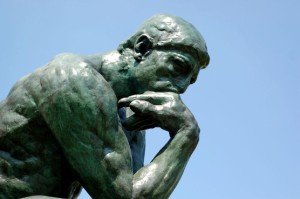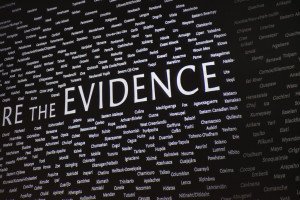Why do I believe in God?
 I didn’t always believe in God; I mean REALLY believe. Sure, I went to church as a kid, but I wasn’t convinced. I wanted it to be true, but I’m a person of facts and reason. I wanted proof–real proof. I wouldn’t even tell others I believed, because I did not feel I could back it up with facts, and I did not want to look like a fool. I used to wonder, if God cares about ensuring I know the truth about Him, and desires that I follow Him, then why won’t he show up, at least prove He exists? I wanted some piece of mind. After all, there are many religions teaching many different things, and they can’t all be right. Simple deduction informed me that either many people believed in some religion when they shouldn’t have believed in any, or they believed in the wrong religion—or maybe they were close, but followed some beliefs that were manipulated by people along the way. The chances of getting it right seemed slim.
I didn’t always believe in God; I mean REALLY believe. Sure, I went to church as a kid, but I wasn’t convinced. I wanted it to be true, but I’m a person of facts and reason. I wanted proof–real proof. I wouldn’t even tell others I believed, because I did not feel I could back it up with facts, and I did not want to look like a fool. I used to wonder, if God cares about ensuring I know the truth about Him, and desires that I follow Him, then why won’t he show up, at least prove He exists? I wanted some piece of mind. After all, there are many religions teaching many different things, and they can’t all be right. Simple deduction informed me that either many people believed in some religion when they shouldn’t have believed in any, or they believed in the wrong religion—or maybe they were close, but followed some beliefs that were manipulated by people along the way. The chances of getting it right seemed slim.
I didn’t want to be lead astray. I didn’t want to buy into a bunch of hocus pocus that doesn’t exist, or worse yet, be manipulated by evil men who twist the truth. So if there were a God who loved me, I wanted Him to show up, talk to me, and set things straight. It made perfect sense to me. If I were God, that’s what I would do—it’s what any sensible person would do. The fact that He didn’t prove himself to me seemed to prove that he simply wasn’t there, or he didn’t care about me, and wasn’t particularly concerned that others were badmouthing Him and spreading misinformation.
As I matured, and gave it more thought, I began to think differently, but was still not fully convinced. Even so, I could not help but be moved by the fact that Christians believe that God did make an appearance some time ago, as Jesus Christ, and did prove His existence, setting people back on the right path (exactly what I wanted). In fact, there seems to be quite a lot of historical evidence to support those events. There were prophesies that foretold, in great detail, the life and death of Chr ist. There were eyewitnesses, even doubters, like Thomas, who were transformed by what they witnessed firsthand. People were so convinced by what they saw with their own eyes that they proved they would rather die than deny it. It’s hard to believe those people died to perpetuate some lie. One of the strongest haters of Christ, Saul of Tarsus, who spent his life hunting Christians so they could be killed, became Saint Paul, one of the most holy and devout followers of Christ, after Jesus appeared to him personally. There were many others, stories dug up in archaeological relics, diaries, letters, all recounting the same events? But these were just stories, weren’t they? But the same story from so many different sources? Only someone who did not want to believe could ignore it completely. People have been sentenced to death in today’s court system with less evidence.
ist. There were eyewitnesses, even doubters, like Thomas, who were transformed by what they witnessed firsthand. People were so convinced by what they saw with their own eyes that they proved they would rather die than deny it. It’s hard to believe those people died to perpetuate some lie. One of the strongest haters of Christ, Saul of Tarsus, who spent his life hunting Christians so they could be killed, became Saint Paul, one of the most holy and devout followers of Christ, after Jesus appeared to him personally. There were many others, stories dug up in archaeological relics, diaries, letters, all recounting the same events? But these were just stories, weren’t they? But the same story from so many different sources? Only someone who did not want to believe could ignore it completely. People have been sentenced to death in today’s court system with less evidence.
As I grew older, and more philosophical, I began to wonder what it would mean if God did appear to me. How would I really react? I came to believe that His sudden appearance in my living room would not be the act of love I once thought it would be—at least not if the Bible were true. From the Bible, we are informed that God gave us freewill, the ability to choose to love and follow Him, or not, based on our own volition. To ensure we have the choice, He put us in this world, where there is ample evidence of His existence, but only indirectly. If God appeared in my living room, I would be awe struck. How could I choose to follow Him or not? I would be completely overwhelmed by His infinite presence, filled with awe, and astounded by my smallness, arrogance, and pitiable life. How could I do anything other than follow Him, love Him, and praise Him? How could I really have freewill? I couldn’t, at least not genuinely—any freewill I had would be overcome by the experience.
 I began to understand how, if the Bible was right, God’s direct absence was nothing less than a gift to me, the freewill to act as His creation, volitionally, and to take pleasure from the world provided for us all. The existence of evil in the world seemed to make more sense too, as part of that gift. Without evil, I would have no ability to choose to do right or wrong—something that makes doing right praiseworthy. After all, if you do all that is right, because you could not do otherwise, or because you were overwhelmed by something that stripped away any notion of doing otherwise, like the direct and infinite presence of God in your living room, then doing right is not particularly praiseworthy because you really didn’t have a choice. Even though I came to understand that, if the Bible was right, God’s personal and direct manifestation to me would not be a gift, I still had a hard time believing in Him. Things were really starting to make sense, but only if the Bible was right, and despite all the evidence I found, it wasn’t enough. I still wanted more before I could really believe.
I began to understand how, if the Bible was right, God’s direct absence was nothing less than a gift to me, the freewill to act as His creation, volitionally, and to take pleasure from the world provided for us all. The existence of evil in the world seemed to make more sense too, as part of that gift. Without evil, I would have no ability to choose to do right or wrong—something that makes doing right praiseworthy. After all, if you do all that is right, because you could not do otherwise, or because you were overwhelmed by something that stripped away any notion of doing otherwise, like the direct and infinite presence of God in your living room, then doing right is not particularly praiseworthy because you really didn’t have a choice. Even though I came to understand that, if the Bible was right, God’s personal and direct manifestation to me would not be a gift, I still had a hard time believing in Him. Things were really starting to make sense, but only if the Bible was right, and despite all the evidence I found, it wasn’t enough. I still wanted more before I could really believe.
I needed one more piece of the puzzle. I needed to decide if there was enough indirect evidence of God in this world to conclude that God exists today. Without the smoking gun, I wouldn ’t fully allow myself to believe. Like any faith, atheism, agnosticism, pantheism, or theism, I knew I would probably never have 100% proof. After all, we rarely have 100% assurance of anything in life. I’m not 100% sure the brakes on my car will work, but I risk my life on them. I was willing to risk believing in God if I had at least that much faith. Call it, proof beyond a reasonable doubt, enough to convict a criminal in court. I needed that much faith. After studying philosophy, and carefully looking for answers, I got the proof I needed.
’t fully allow myself to believe. Like any faith, atheism, agnosticism, pantheism, or theism, I knew I would probably never have 100% proof. After all, we rarely have 100% assurance of anything in life. I’m not 100% sure the brakes on my car will work, but I risk my life on them. I was willing to risk believing in God if I had at least that much faith. Call it, proof beyond a reasonable doubt, enough to convict a criminal in court. I needed that much faith. After studying philosophy, and carefully looking for answers, I got the proof I needed.
